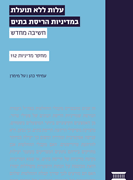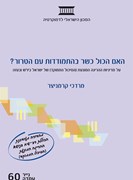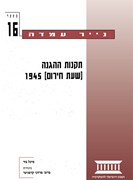

Publications Regarding Democracy in Defense
Articles

The Appointment of the Next Shin Bet Chief and The Advisory Committee on Senior Civil Service Appointments
Written By: Dr. Assaf Shapira
When and why was the Advisory Committee on Senior Civil Service Appointments established, what are its powers, and which appointments is it supposed to review? Everything you need to know about the "Grunis Committee" that is examining the candidacy of Major General Zini for head of the Shin Bet.

The Hidden Lesson of Israel's Iran Victory
Written By: Yohanan Plesner
Israel’s victory over Iran was not just a triumph of military strategy—it was a testament to democracy and moral clarity. In a region plagued by autocracy, it is Israel’s enduring commitment to freedom, pluralism, and the rule of law that gives it the resilience and strength to prevail.

Some No Longer Believe the Prime Minister Can Violate the Rule of Law - He Is the Law
Written By: Adv. Anat Thon Ashkenazy
When loyalty to the Prime Minister is seen as loyalty to the law itself, Israel risks replacing democracy with rule by decree—undermining the very foundations of the rule of law.

Chaos in the Courtroom, Clarity on the Bench
Written By: Prof. Suzie Navot
Everything you need to know about yesterday's High Court hearing on Netanyahu's efforts to fire Shin Bet Director Ronen Bar went.

Politicization of the Shin Bet is Dangerous to Israel's Security and the Rights of Israelis
Written By: Dr. Eran Shamir-Borer, Prof. Amichai Cohen
Maintaining the Shin Bet’s independence from political influence is essential to preserving both Israel’s national security and the democratic rights of its citizens.

Arab Representation in the Judiciary is Under Threat
Written By: Adv. Lital Piller
By shifting power from professional bodies to political appointees the new law restructuring the Judicial Selection Committee is likely to reduce Arab representation and exacerbate their exclusion.

The Government Against the Rule of Law
Written By: Dr. Guy Lurie
The Israeli government's current efforts to dismiss the head of the director of the Shin Bet and the Attorney General, alongside its attempt to restructure the Judicial Selection Committee, reflect a broader shift toward subordinating legal and security institutions to political authority, raising concerns about the erosion of the rule of law and the future of democratic governance in Israel.

Explainer: The Prime Minister’s Decision to Pursue the Dismissal of the Head of the Shin Bet
Written By: Prof. Amichai Cohen, Dr. Eran Shamir-Borer
On March 20, 2025, Israel’s government voted in favor of Prime Minister Benjamin Netanyahu’s decision to dismiss Ronen Bar, head of the Shin Bet, citing "growing distrust" in the security chief. The following document answers key legal questions around this announcement.

Exploiting the Public's Distraction to Pursue the Judicial Overhaul
Written By: Dr. Guy Lurie
Amidst the return to fighting in Gaza, the Minister of Justice is taking advantage of the public's eye being off the ball to hastily overhaul Israel's judicial system.

Putting Knesset Members Above the Law
Written By: Dr. Amir Fuchs
The amendment to the Immunity Law proposed by MK Tally Gotliv would allow MKs to grant themselves immunity from criminal and civil prosecution, undermining equality before the law and creating inherent conflicts of interest that disproportionately protect coalition members from accountability.

Does Shin Bet chief Ronen Bar's dismissal endanger Israeli democracy?
Written By: Prof. Amichai Cohen
Prime Minister Netanyahu has informed Israel Security Agency Shin Bet Director Ronen Bar of his decision to fire him. Netanyahu cited his mounting lack of confidence in Bar as grounds for his dismissal. KAN's Mark Weiss spoke about the prime minister’s decision to dismiss Ronen Bar with Prof Amichai Cohen, a Senior Fellow at the Israel Democracy Institute.

Four Comments on the Decision to Dismiss the Head of the Shin Bet
Written By: Prof. Suzie Navot
On March 16, 2025, Prime Minister Netanyahu announced his intention to bring the dismissal of Ronen Bar, the head of the Israeli Security Agency (Shin Bet), Israel's internal security service, to a vote of the full cabinet. Though not a perfect comparison, the Shin Bet is often seen as comparable to the FBI in the US.

Israel and the Freedom in the World Report: A Pattern of Continuing Decline
Written By: Dr. Assaf Shapira, Prof. Ofer Kenig
In just over a decade, Israel’s score in the report published by Freedom House has fallen by 8 points, a decline that now puts it alongside countries such as Brazil and Namibia.

Israel’s Renewed Judicial Overhaul
Written By: Prof. Yuval Shany, Prof. Amichai Cohen
The battle over Israel’s legal system has resumed, threatening judicial independence.

The Dangerous Politicization of Judicial Appointments
Written By: Dr. Amir Fuchs
Changes in the composition of the Judicial Selection Committee threaten the independence of the judicial system. The current proposals would lead to a complete politicization of appointments to all courts and should be blocked.

Bill Proposal: Ombudsman of the Israeli Judiciary (Amendment – Appointment of the Ombudsman), 2024
Written By: Dr. Guy Lurie, Dr. Amir Fuchs
The proposed bill, which would change the selection process of the Ombudsman - responsible for investigating complaints about the conduct of judges and religious court judges - aims to intimidate judges and undermine their independence.

What Happens When Israel’s Minister of Justice Refuses to Cooperate with the Chief Justice?
Written By: Dr. Guy Lurie
IDI's Dr. Guy Lurie explains the far-reaching implications of non-cooperation between the two leaders of Israel's judiciary.
"It's the everyday citizens who are sure to pay the price."

The Danger of a Politicized Judicial Selection Committee
Written By: Dr. Guy Lurie
Dr. Guy Lurie, a Research Fellow at IDI's Democratic Values and Institutions Program, offers a breakdown on the risks of politicization inherent in the recent proposal by Minister of Justice Levin and Foreign Minister Sa'ar to reform the Judicial Selection Committee.

A Dangerous Attempt to Politicize Israel's National Security
Written By: Dr. Eran Shamir-Borer, Adv. Edna Harel Fisher
Defense Minister Katz recent demand that the IDF Chief of Staff reprimand the Chief of the IDF Intelligence Directorate for presenting the possible security implications of the "Trump plan" for Gaza is the latest in several steps that threaten to politicize Israel's national security agencies, a process that could be disastrous for the country.

A Chief Justice Under Attack
Written By: Prof. Suzie Navot
While the selection of Justice Amit as President of the Supreme Court was done in accordance with the relevant legislation, the Justice Minister has declared the procedure "fundamentally improper and illegal." His refusal to recognize the selection creates a precedent that may lead to the deterioration of the authority of other institutions. This is what the beginning of a constitutional crisis looks like.

A Legitimate Supreme Court President
Written By: Dr. Guy Lurie
Following Justice Isaac Amit's selection as Supreme Court President, Minister of Justice Levin immediately declared he would refrain from any collaboration between them, describing the selection process as unlawful. This announcement is both factually incorrect and a serious dereliction of his duties.

Ministers Levin and Saar's Proposed Changes to the Judicial Selection Committee
Written By: Dr. Guy Lurie
Justice Minister Yariv Levin and Foreign Minister Gideon Sa’ar presented their proposed changes to the composition of the Judicial Selection Committee (JSC) as a compromise aimed at achieving a gradual change in the judicial selection process, but many constitutional experts worry that the plan will have dire consequences resulting in the politicization of Israel’s judicial selection process.

The Takeover of Law Enforcement and Security Agencies as a Pivotal Factor in Democratic Decline | A Comparative Analysis
Written By: Dr. Nadav Dagan, Adv. Sapir Paz
Law enforcement and security agencies are central pillars of democratic rule, and therefore, their capture is a pivotal factor in democratic decline. A comparative analysis by IDI experts reveals that this takeover is often achieved quietly while striving to present all steps as lawful.

Five Lessons from South Korea: On Democracy, Liberty and States of Emergency
Written By: Dr. Nadav Dagan
When South Korean President Yoon Suk Yeol, who previously praised liberal democracy, declared martial law, a swift and decisive response from the general public, and subsequently parliament, thwarted the move within hours. These events illustrate that in order to increase the chances of recovery and inoculation against democratic backsliding, democratic institutions must be strengthened.

IDI Survey: Most Jewish Israelis feel safer in a scenario with high number of civilian firearms; most Arabs feel less safe
Written By: Viterbi Family Center for Public Opinion and Policy Research, Center for Security and Democracy
The Center for Security and Democracy and the Viterbi Center for Public Opinion and Policy Research at the Israel and personal security—the present release focuses on internal security; a press release will follow tomorrow focusing on national security.

Minister of Defense Gallant is Fired: A Review of the Dismissal of Israeli Cabinet Ministers
Written By: Prof. Ofer Kenig
At first glance, the dismissal of Minister of Defense Yoav Gallant is not unprecedented – prime ministers hold authority to fire ministers, and Prime Minister Netanyahu has done so in the past. However, the circumstances surrounding the current dismissal are especially intense.

The Security Cabinet Should Play a Greater Role in Determining Hostage Negotiations
Written By: Prof. Amichai Cohen, Adv. Mirit Lavi
The Prime Minister’s decision to retain the power to determine the parameters and scope of the hostage deal as a “policy issue” disregards the implications such a deal has on security issues. Israeli history underscores the importance of convening the security cabinet and upholding the appropriate democratic channels in times of war.

Even Against Terrorists – The Rule of Law Prevails
Written By: Prof. Suzie Navot, Adv. Sapir Paz
The rule of law is a fundamental democratic principle, meaning that all governing bodies are subject to and must comply with the law. Despite the complexities inherent in ongoing war, this is true also of the IDF, and only decisive action against breaches of conduct may protect the rule of law in Israel and Jewish morality.
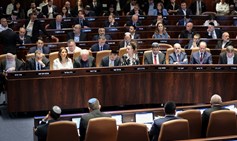
The Judicial Overhaul and Anti-Democratic Initiatives
Written By: Adv. Anat Thon Ashkenazy, Adv. Daphne Benvenisty
Judicial overhaul initiatives, along with other anti-democratic measures, have continued to be promoted by the government and the coalition in the Knesset. This document outlines the various actions taken in government that weaken the Israeli judiciary and democracy at large.

Iran’s Attack Sets a Dangerous Precedent
Written By: Dr. Jesse Ferris
The Iranian missile attack on April 13th set a very dangerous precedent for the future. Had one of the few missiles that managed to penetrate Israel's air-defense shield been fitted with a nuclear warhead, the outcome would have been devastating. This is why the phenomenal achievement of the Israeli Air Force and its allies on Saturday night must not blind us to the danger ahead.

Can a Criminal Defendant be Banned From Forming a Government?
Written By: Dr. Dana Blander
Minister Gideon Saar's proposed bill preventing a criminal defendant from forming a government is unprecedented, but so is the reality in Israel.
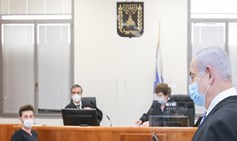
A Prime Minister on Trial: Qs and As
Written By: Dr. Amir Fuchs
The Prime Minister's trial reconvenes with a pandemic raging and the elections camping continuing. What can we expect?

Regulating Offensive Online Speech—Are the Times Finally A-Changin’?
Written By: Prof. Yuval Shany
The fast-moving escalation in the conflict between President Trump and Twitter in the last week of May may prove in hindsight to be a watershed development for the legal architecture of online social media.

Without Trust, There Can Be No Compliance
Written By: Dr. Dana Blander
The Israeli public deserves leadership that isn't weighed down by a track record of incoherent instructions, selective enforcement, and politicians’ own failure to comply
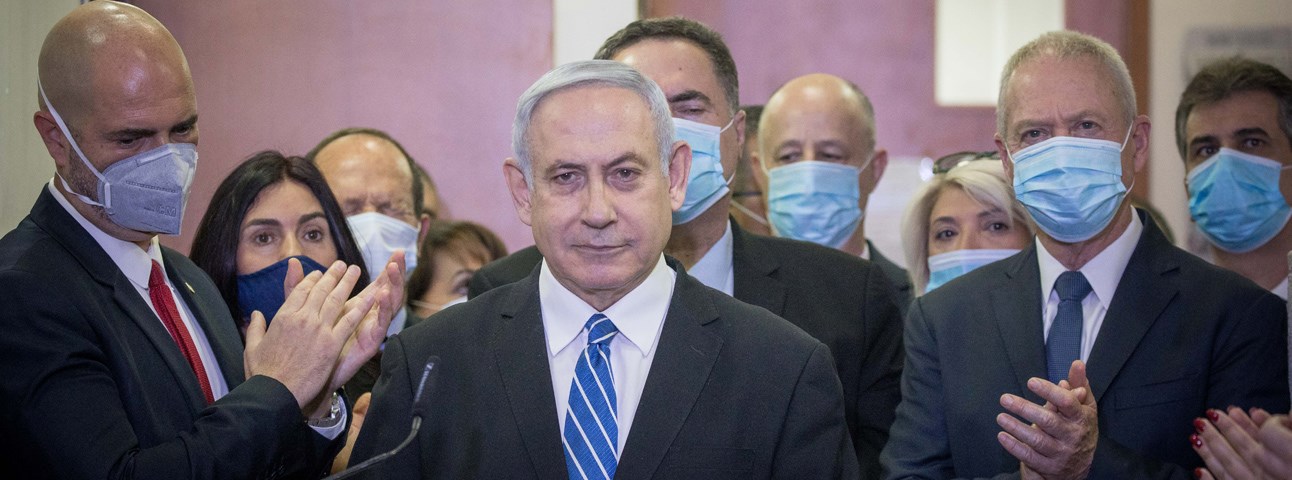
On the Street or in the Courtroom?
Written By: Prof. Yedidia Z. Stern
The Prime Minister’s supporters are trying to entrench a perception among the public that he is facing a political – rather than a criminal – trial.
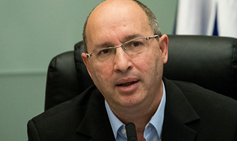
Recommendations for the Incoming Justice Minister
Written By: Dr. Nadiv Mordechay
After three contentious election campaigns Israel's new government has been sworn in. IDI's experts weigh-in with their recommendations on the most important issues on the agenda.
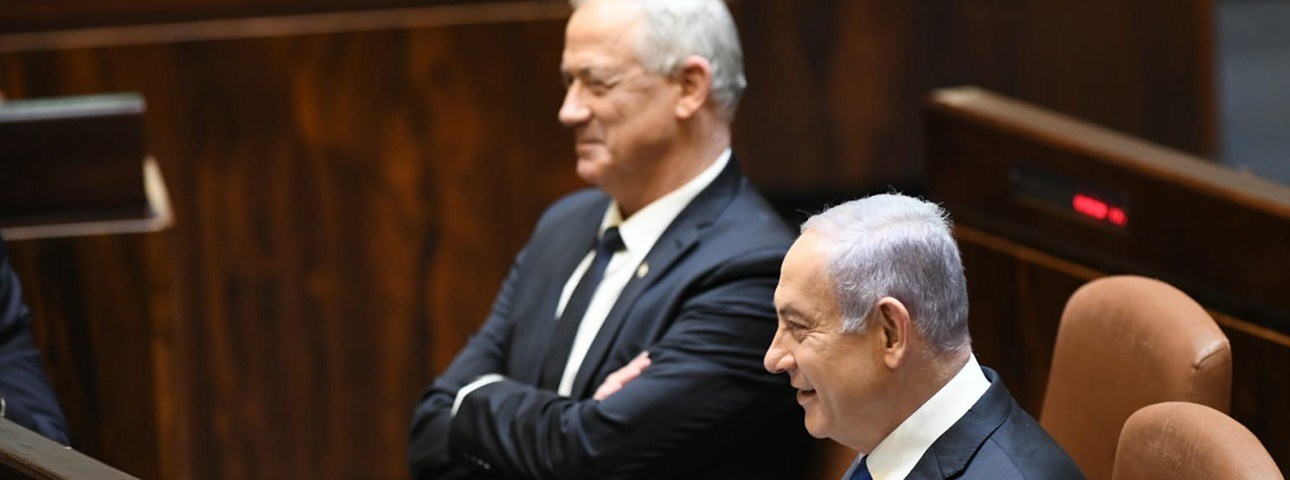
Israel’s Cease-Fire Government Should Promote Healing, Not Division
Written By: Yohanan Plesner
Netanyahu and Gantz could use their unity government to put in place a 'democratic ceasefire' and speed Israel’s economic recovery rather than entrenching political deadlock.
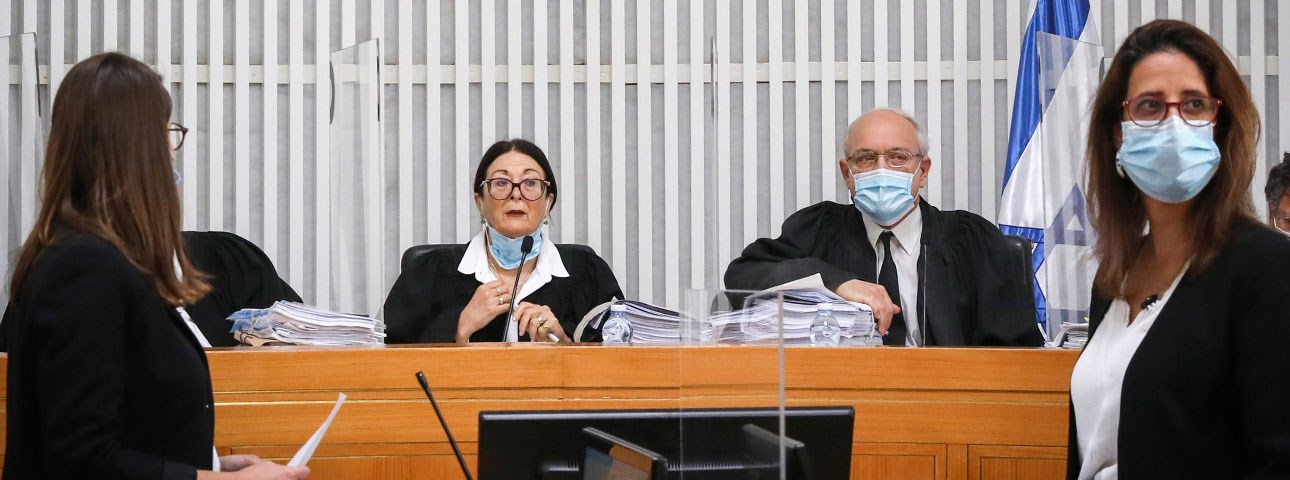
Live Broadcasts from the Supreme Court
Written By: Yair Sheleg
Live broadcasts brings a breath of fresh air and a better understanding of the Supreme Court
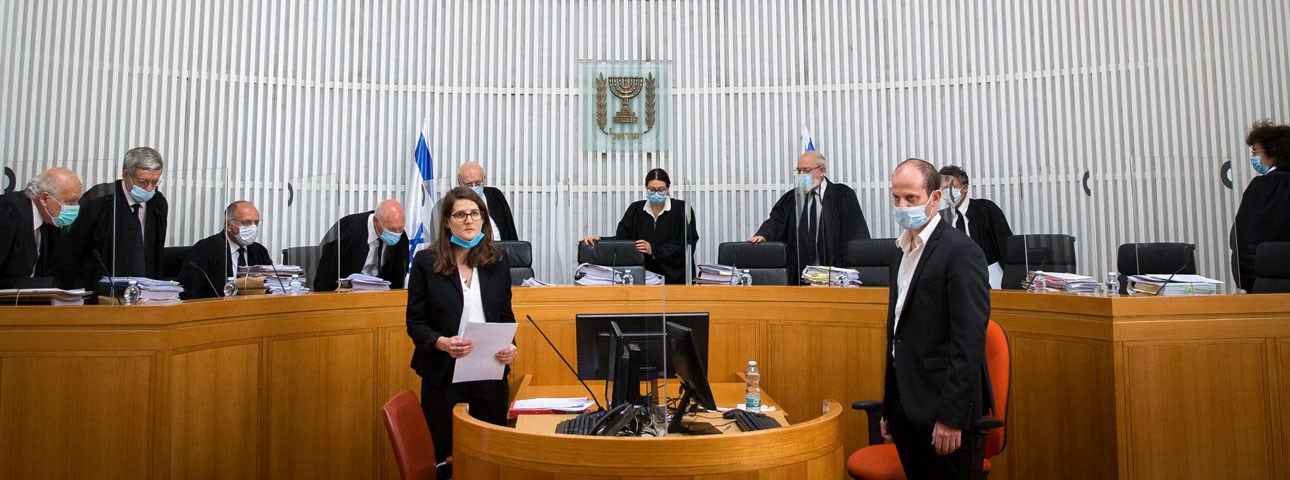
Bibi is Given the "Go Ahead" by Supreme Court
Written By: Dr. Amir Fuchs
IDI’s Dr. Amir Fuchs speaks with Richard Pater of Bicom about the recent Supreme Court hearing and the rulings they handed downs regarding the new government

Will the Coronavirus Defeat the Populism Epidemic?
Written By: Dr. Dana Blander
The coronavirus is an international threat but will it stem the growth of populism around the world?
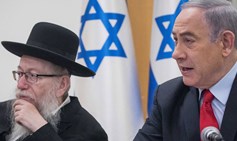
Israel's Democracy in the Time of Corona
Written By: Yohanan Plesner , Prof. Yuval Shany, Prof. Karnit Flug
IDI's management convened an online 'town hall' with Yohanan Plesner, Yuval Shany, Karnit Flug and Jesse Ferris to discuss the political, constitutional and economic fallout from the corona crisis, and IDI’s unique role in addressing it.

Virus and Democracy
Written By: Prof. Yedidia Z. Stern
Even a life-saving measure must be weighed against the threat it poses to democracy -- we do it all the time
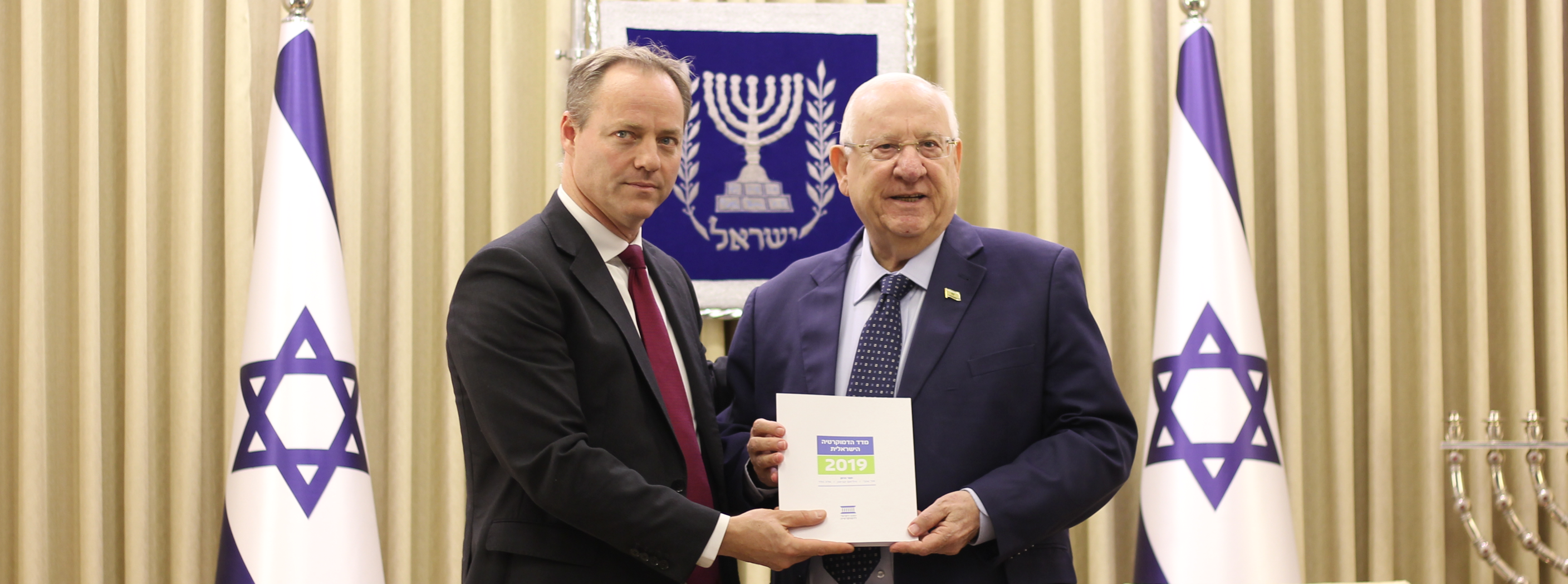
IDI Releases 2019 Democracy Index
Written By: Prof. Tamar Hermann, Dr. Or Anabi, Dr. William Cubbison, Ella Heller
50% of Israelis Believe that the State of the Country is 'Good'. Conversely: 58% of Israelis Believe that Their Leadership is Corrupt and 59% of Israelis Think that Supreme Court Judges’ Rulings are Politically Biased
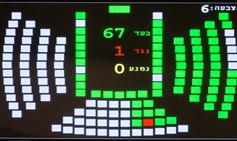
A Decade of Anti-Democratic Legislation
Written By: Dr. Amir Fuchs
The last decade in Israel has been marked by a wave of legislation that has dealt a blow to the country’s democratic values, the rule of law, and separation of powers.

A Legal or Political Matter?
The political system is being dragged into elections for the third time within a year, for what seem to be extraneous reasons related to the question of how Netanyahu will handle his cases

Populism and its Implications for Democracies: Summary
International Experts Gather at IDI to Debate Populism and its Implications for Democracies as Israeli Electoral Deadlock Continues

Justice in the Courtroom, Not in the Streets
Written By: Prof. Yedidia Z. Stern
Our level-headed, intelligent, rational prime minister has lost his good judgment and is inciting against some of the most important institutions of state

Israel's Real Minority Government
Written By: Dr. Amir Fuchs
The rhetoric accompanying the attempts to delegitimize a “minority government” is questionable. The current transitional government is supported only by 55 Knesset members, with 65 opposing it. If any government deserves the moniker ‘minority government,’ it is the one currently in office.
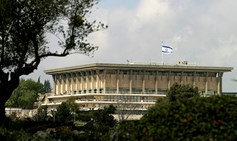
Despite The Election Tumult, Israeli Democracy Dodged A Bullet
Written By: Yohanan Plesner
Coalition negotiations continue and Israel does not yet have a government - but one thing is certain - Israeli democracy dodged a bullet.

Jewish or Democratic? We Mustn’t Choose Between Them
Written By: Dr. Shuki Friedman
Recent elections have brought to fore the struggle between religion and state - the balance between the constitutional elecemtns and the place of religion. In this tug-of-war, a compromise can be the only victory.
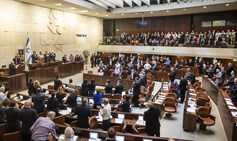
Democracy: Rule of the People?
Written By: Prof. Yuval Shany
The recent wave of populism forces us to sharpen our understanding of the literal meaning of 'democracy' and 'the rule of the people' as well as the accepted definition of liberal democracy

So You Want to Lead the Country? Show Us Your Calendars
Written By: Adv. Alona Vinograd
The public - your employer - has the right to know how often you skip the Knesset plenum or travel abroad. Election date is getting closer and there is no better time than now, to give some thought to the public’s right to information

Toward Tyranny of the Majority
Written By: Dr. Amir Fuchs
Granting the government additional power, which will enable overriding Basic Laws in simple legislation must not be allowed, lest the defense of basic civil rights in Israel are compromised
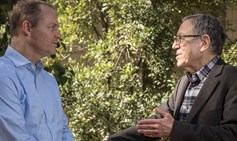
Is Israel's Democracy in Crisis?
Written By: Yohanan Plesner , Prof. Irwin Cotler, By: Steve Linde
IDI’s President Yohanan Plesner and Canadian jurist Irwin Cotler on the challenges facing Israeli democracy in the months ahead.

We the People: Democracy in the Age of Populism
Written By: Prof. Yuval Shany
Populism means different things to different people – and political populism has an even more sinister meaning

The Liberal-Democratic Camp Will Keep on Losing Elections
Written By: Dr. Shuki Friedman
Change will come only by engaging in an extended struggle over values, and by offering a true Jewish-democratic alternative in which both components are strong and complement one another

The Democracy Pavilion
The Democracy Pavilion, a unique multi-media experience, in full 360 degree technology, showcasing the values embedded in Israel’s Declaration of Independence, will open to the public on Independence Day.

Take Great Care When You Limit Freedom of Expression
Written By: Prof. Yedidia Z. Stern
Instead of training rhetorical cannons on the court, which is doing its job in a chaotic situation, the legislature should delete Section 7A from the Basic Law. Let everyone run for the Knesset, and let those who violate criminal laws bear the consequences of their actions

Whatever Happened to the Likud's Liberal Values?
Written By: Dr. Amir Fuchs
Dr. Amir Fuchs looks at how far removed today’s Likud is from the Likud of yesteryear, both in terms of personalities and ideologies
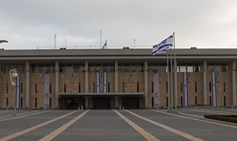
Will 2019 Be the Moment of Truth for Israeli Democracy?
Written By: Yohanan Plesner
Will Israel's democratic institutions prove resilient? How is the party system changing and is Israel headed for a tyranny of the majority? Yohanan Plesner, President of the Israel Democracy Institute, examines the ramifications of the unprecedented indictment of an incumbent Prime Minister in Israel
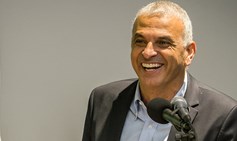
The Constitutional Tug of War in the Outgoing Coalition
Written By: Dr. Amir Fuchs
The 20th Knesset was the most injurious of all with regard to democratic values, freedom of expression, gatekeeping and, above all, minority rights. In the next government we can only hope that someone will champion liberal center-right values to continue to protect our democracy.

Beyond the Veil of Ignorance
Written By: Prof. Yedidia Z. Stern
One fact is clear: the moment the attorney-general announces his decision, half of the public will reject it, to the point of accusing him of serving political interests and not really seeking the truth.
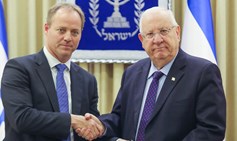
Is Israeli Democracy in Danger – Interview with Yohanan Plesner
Why do nearly half of Israelis believe that their political leadership is corrupt and that their democracy is in danger? Gil Hoffman interviews Israel Democracy Institute President Yohanan Plesner, on the findings of the 2018 Israeli Democracy Index
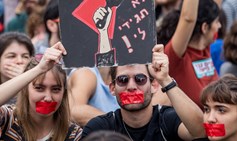
No, Democracies Don't Have "Cultural Loyalty" Laws
Written By: Adv. Edna Harel Fisher
The truth is that the bill was designed to castrate expression and creativity, and induce self-censorship by artists and cultural institutions.

The Role of Politicians and the Role of Attorneys
Written By: Colonel (Res.) Dr. Liron A. Libman
For Israel, coping with the situation in the Gaza Strip is far from simple. The way the situation is handled has security, economic, humanitarian, and political implications. Therefore leadership must act and speak responsibly - this is not always the case.
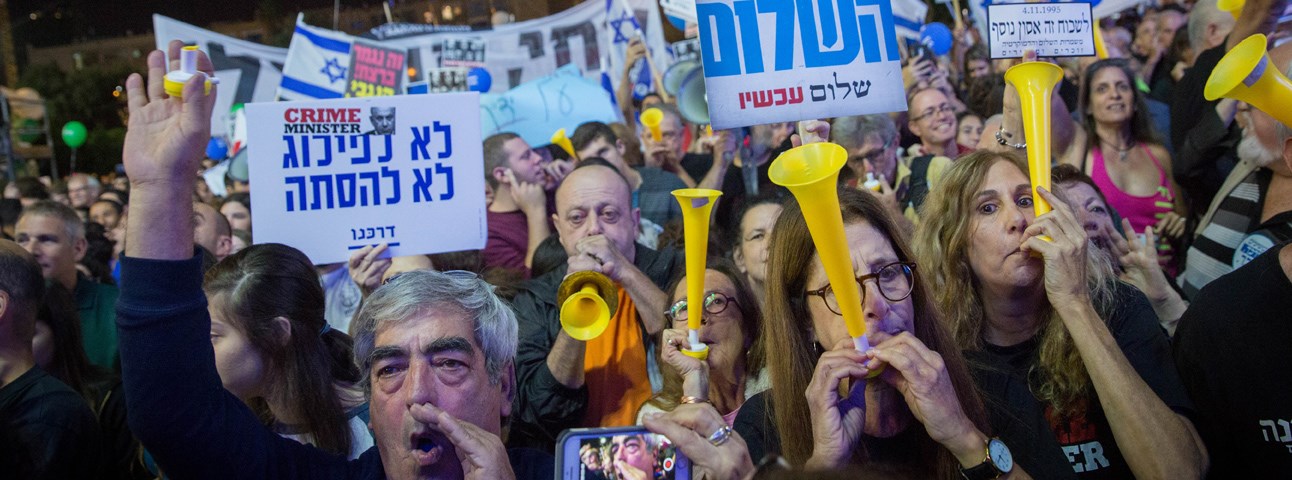
Beit Shemesh and Tel Aviv
Written By: Prof. Yedidia Z. Stern
How despicable is a mob that calls for non-partisanship but is unwilling to listen to a voice that speaks for a majority of Israelis today?
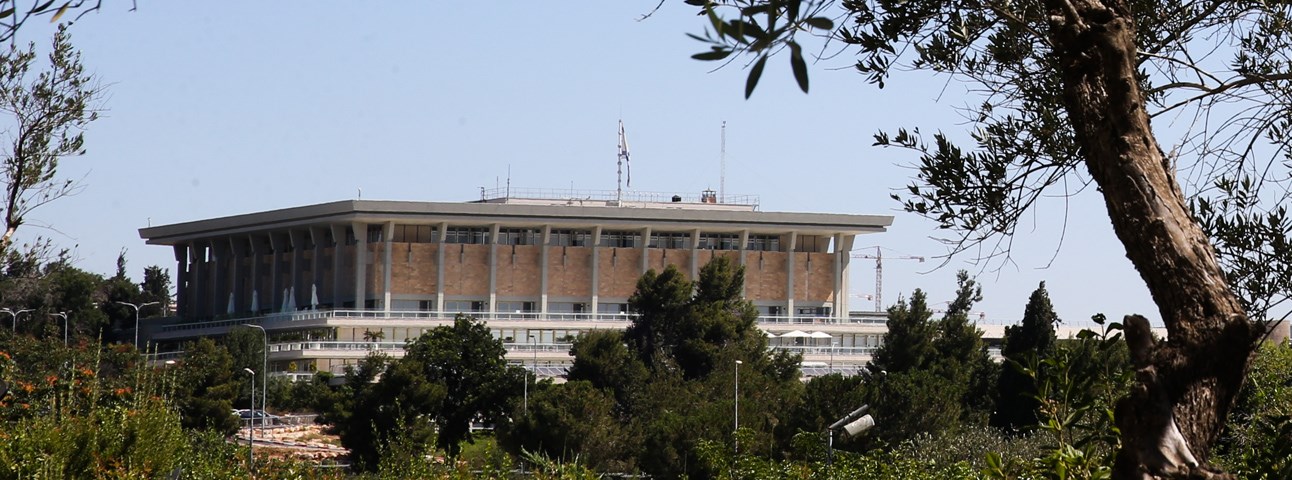
Israeli Democracy at 70
Written By: Adv. Alona Vinograd
Israel at 70 is still a thriving democracy, but current concerns are justified, says Alona Vinograd in an interview to Fathom.
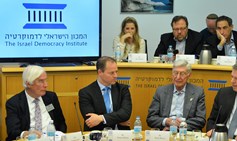
Strengthening Jewish Unity by Strengthening Israeli Democracy
Written By: Yohanan Plesner
As Israel enters its eighth decade, Yohanan Plesner, President of the Israel Democracy Institute, reflects on the delicate balance between the state’s two dominant characteristics – Jewish and democratic – which has never been more contested.
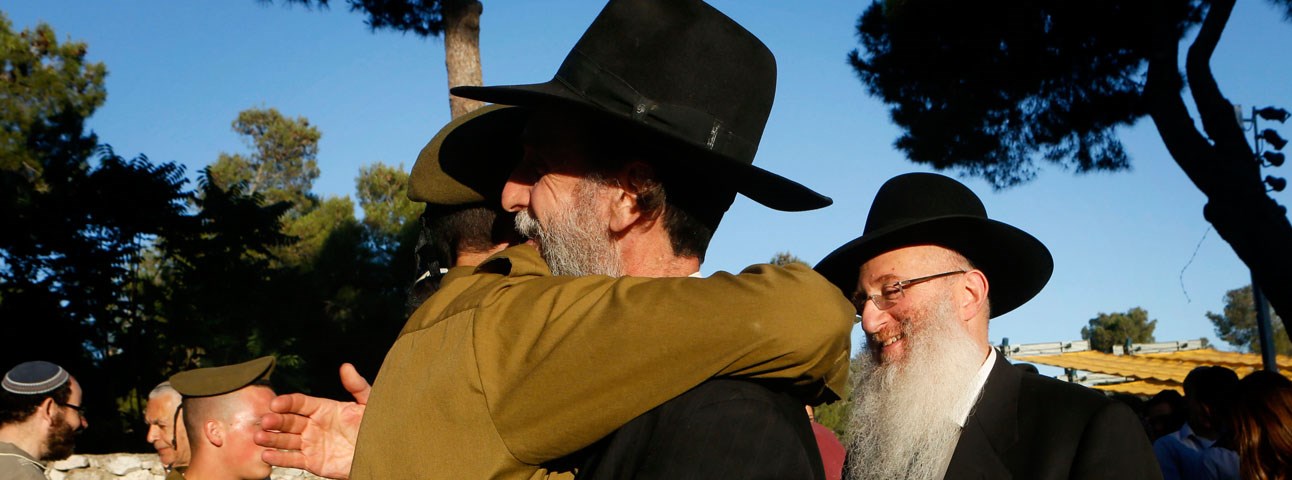
Israel needs a draft law that will uphold the principle of civic equality
Written By: Yohanan Plesner
Now is the time to rise above petty politics and pass a draft law that will uphold the principle of civic equality in Israel.

Supporting the LGBTQ's Struggle for Equality
The Israel Democracy Institute’s management announced its support for the LGBTQ’s struggle to amend the newly passed Surrogacy Law so as to included gay couples.

The Nation State Bill is a Constitutional Abandonment of Diaspora Jewry
Written By: Dr. Shuki Friedman
This bill is superfluous and will do far more harm than good. In its newly revised version, the Nation-State Bill, which has been problematic since its inception, reaches new lows by effectively abandoning Diaspora Jewry.
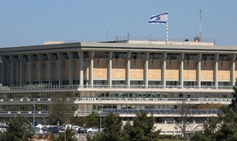
The Nation State Bill Bias
Written By: Dr. Amir Fuchs
How can Israel - a light to the nations, and homeland for the Jewish People, fail to embrace equality for all, alongside commitment to the diaspora?

The Attack on Legal Oversight Threatens Us All
Written By: Prof. Yedidia Z. Stern
Government-sponsored legislation proposing to change how ministry legal advisors are appointed has stirred up quite a storm. The idea should worry all of us, not only jurists.

On Political Appointments of Legal Advisers in Government Ministries
Written By: Yohanan Plesner , Prof. Yuval Shany, Prof. Yedidia Z. Stern
The Israel Democracy Institute ahead of the Knesset Constitution Committee debate on political appointments of legal advisers in government ministries: "A blow to the civil service ethos; an opening for potential corruption, forsakes public interest".
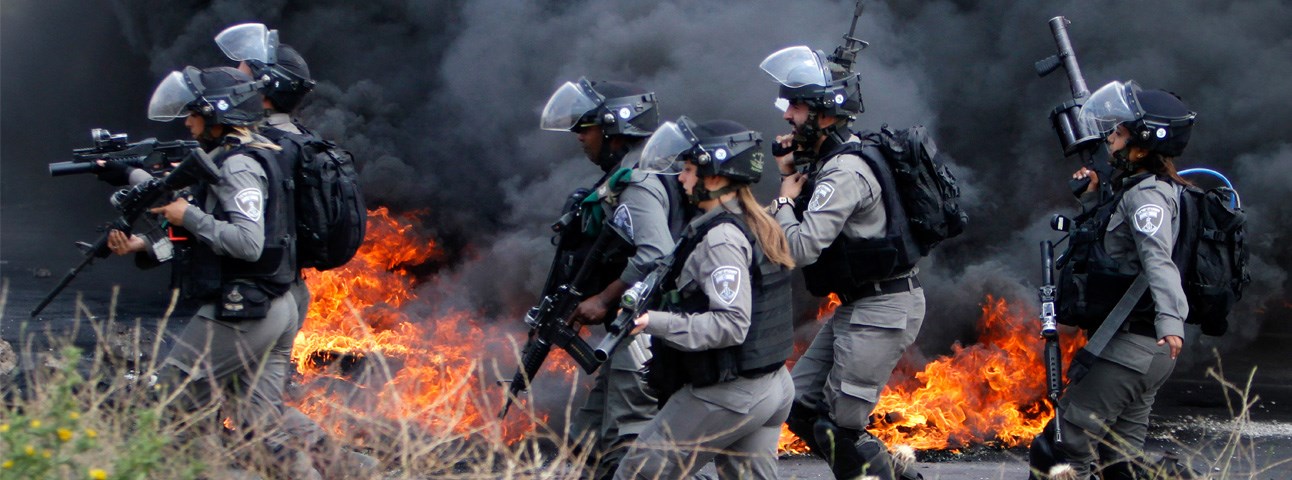
Will Israel go to war in the coming months?
Written By: Prof. Tamar Hermann, Prof. Ephraim Yaar
The monthly Peace Index of the Israel Democracy Institute and Tel Aviv University, published today, finds that the Israeli public split on prospect of war in the coming months
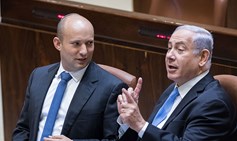
Who will be Overridden by the “Override Clause”?
Written By: Yohanan Plesner
The good news is that despite the unprecedented offensive which aims at dealing a significant blow to the Supreme Court, the majority of the Israelis still have trust in this institution. In fact, the levels of trust in the court are much greater than those of the Knesset and the Government

Watch the Construction of the Democracy Pavilion in 60 Seconds
Ron Huldai, Mayor of Tel Aviv-Yafo Municipality: "The establishment of the Democracy Pavilion is an impressive demonstration of Israeli democracy. Only in a democratic society can freedom and tolerance co-exist. This is what allows the opposing sectors of Israeli society to live side by side." The Democracy Pavilion is located at the start of the Independence Trail in Tel Aviv and is open to the public free of charge.
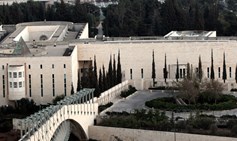
Government Ministers to Vote on Bill to Override Supreme Court Decisions
Written By: Lahav Harkov | Jerusalem Post
The Prime Minister is currently fighting to remove the Supreme Court's power to strike down Knesset legislation, thereby turning the last protector of human rights in Israel into merely an advisory board. He is even threatening elections over the issue.

The Democracy Pavilion
After months of preparation, we are proud to inaugurate, along with the Tel-Aviv-Yafo Municipality, the Democracy Pavilion, celebrating 70 years of Israel’s independence. A unique multi-media experience, in full 360-degree technology, showcasing the values embedded in Israel’s Declaration of Independence and the historic highlights of 70 years of independence.

A People’s Army Amidst Social Change
Written By: Arie O'Sullivan, Prof. Yuval Shany, Prof. Amichai Cohen,
Despite the transformation of Israeli society, the IDF’s model of service has not changed. Military service continues to be a rite of passage for young Israelis and the IDF retains its status as the most trusted institution in Israel. Prof. Yuval Shany, Maj.-Gen. (ret.) Orna Barbivai and Prof. Amichai Cohen sit down to discuss the challenges facing the IDF and Israeli society in a changing security environment.

Fertile Ground for Growth: The Jewish State’s Balancing Act
Written By: Steve Linde
Beinisch and Plesner voice optimism about the future of Israel despite current tensions and threats to its democracy
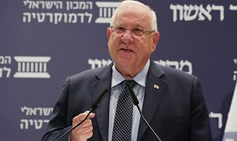
A Democracy in Flux
President Reuven Rivlin, Justice Minister Ayelet Shaked,Leader of the Israeli Labor Party Avi Gabbai and State Prosecutor Shai Nitzan relate to tensions surrounding the prime minister's investigations and the coalition crisis at a special conference held last night with Makor Rishon

Proposed Basic Law: Torah Study
Written By: Yohanan Plesner , Prof. Yedidia Z. Stern, Prof. Yuval Shany
Letter to Members of the Knesset on the proposed Basic Law: Torah Study - "This is an extremist proposal to enshrine the principle of inequality in our law books.Its adoption could undermine the IDF’s model of service and place Israel’s national security in jeopardy"

The proposed Basic Law: Torah Study has far-reaching economic implications
Written By: Yohanan Plesner , Prof. Yuval Shany, Prof. Yedidia Z. Stern
In a letter to the Members of Knesset, IDI's management clarifies that the ultra-Orthodox proposed legislation will influence budgetary matters such as allocations to Yeshiva students and housing grants, and will place Israel’s national security in jeopardy
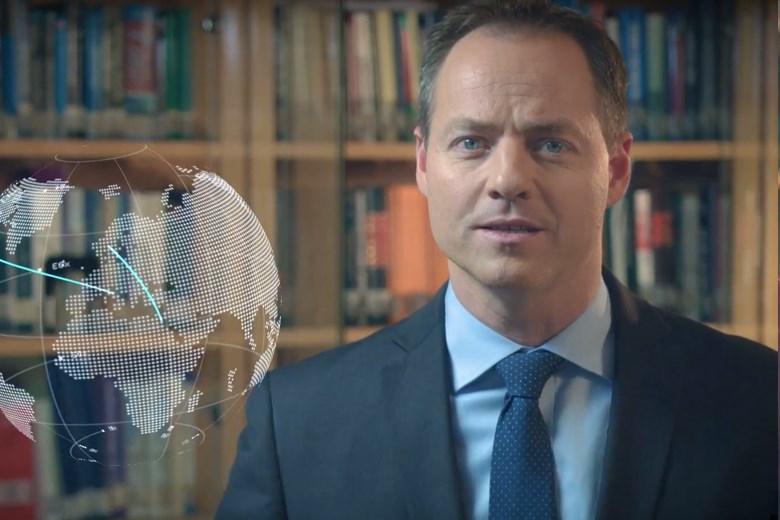
Ensuring a Vibrant Democracy
Written By: Yohanan Plesner

Responsibility to Protect – a Right of Self-Defense for All States against Atrocities
Written By: Prof. Mordechai Kremnitzer
This essay makes a case for the international community’s right of self-defense against atrocities, through its members, and to refer briefly to the challenge of implementing such a right.

Are Israeli soldiers at risk of prosecution abroad?
Written By: Prof. Amichai Cohen
Prof. Amichai Cohen argues that there is only one good way to prevent prosecution of Israeli soldiers abroad: Israeli authorities must conduct effective, independent, and genuine investigations in cases where there are suspicions of war crimes or other violations. This article was first published by Times of Israel.
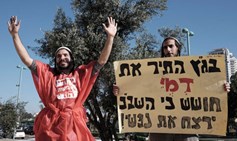
Torture Laws Must Apply To Arab And Jew Alike
Written By: Prof. Mordechai Kremnitzer
Dr. Mordechai Kremnitzer argues that it is time for Israel to examine the Shin Bet security service's regulations, based on the assumption that they apply to all residents of Israel. One law must apply to all suspected perpetrators of terrorist acts — Jews and Arabs alike.
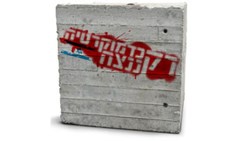
Our Democracy is Being Tested
Written By: Dr. Amir Fuchs
Dr. Amir Fuchs delivers the following message: While Israeli security forces must fight terror using all legal means available to them, Israeli leaders have another and no less important role: to maintain the democratic character of the state. This is especially the case when it comes to equality, minority rights and defending the innocent from acts of revenge and/or lynching.

Are House Demolitions an Effective Tool in the Battle Against Terrorism?
Written By: Adv. Tal Mimran
Is demolishing terrorists' homes an effective deterrent? Israel Democracy Institute research – based on previous work conducted by the security establishment – has cast a doubt on its value. There was also a research report published in 2005 by a professional committee led by Maj. Gen. (Ret.) Udi Shani, which led to the cessation of house demolitions for three years.

What this war is about and how it will end
Written By: Admiral (Res.) Amichay (Ami) Ayalon
Parallel to negotiations, a process, designed to create a two-state reality through independent and unconditional steps, must be implemented
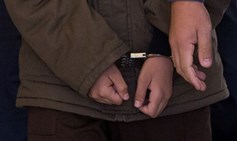
It’s Time to Stop the Use of Administrative Detention in Israel
Written By: Dr. Amir Fuchs
Is administrative detention an appropriate response to Jewish terror such as the events in Duma? Dr. Amir Fuchs argues that there is no justification for administrative violations of a person’s freedom except for in concrete emergencies in which criminal law would be impossible to apply.

Organized Criminals Today, Everyone Else Tomorrow
Written By: Lina Saba
In an op-ed in Haaretz, Attorney Lina Saba-Habesch warns that extending the use of administrative detention to apply to suspects in cases of organized crime could lead to the use of this extreme method, or of other extreme methods, in combating other forms of crime.

Using Administrative Detention to Combat Organized Crime
Written By: Aviad Ben Yehuda
Aviad Ben Yehuda discusses the problematic nature of the proposal to extend the use of administrative detention in Israel from the war on terror to the war on organized crime.

Prof. Mordechai Kremnitzer Speaks Out on Using Administrative Detention in Cases of Organized Crime
Written By: Prof. Mordechai Kremnitzer
IDI Vice President of Research Prof. Mordechai Kremnitzer responds to the possibility that the police will use administrative detention to combat organized crime, much in the manner as it is used to combat terrorism.
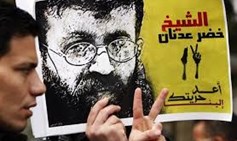
Is Administrative Detention the Right Tool for Fighting Terrorism?
Written By: Elad Gil
On February 21, 2012, just before the High Court of Justice was to hear his petition, Palestinian detainee Khader Adnan agreed to end his life threatening hunger strike after Israeli authorities agreed to release him in April, at the end of four months of administrative detention. Attorney Elad Gil explores basic questions about the use of administrative detention in Israel and highlights lessons learned from the Adnan affair.

Israeli McCarthyism?
Written By: Prof. Mordechai Kremnitzer, Shiri Krebs
In this op-ed article, IDI Vice President of Research Prof. Mordechai Kremnitzer and IDI researcher Adv. Shiri Krebs question the wisdom of forming a parliamentary commission of inquiry into the funding of Israeli human rights organizations. They warn against a slippery slope to McCarthyism and point out that the establishment of the commission, far from strengthening Israel’s legitimacy, will accelerate efforts to delegitimize Israel and prosecute Israeli officials overseas.

An Israeli Republic, If We Can Keep It
Written By: Yohanan Plesner
Israel must not squander its opportunity for much needed renewal, but first the people need to weigh in and choose a consensual mechanism of constitutional reform
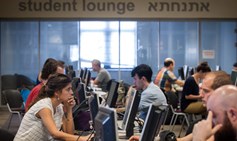
A Moment of Reckoning for the Education System
Written By: Dr. Tammy Hoffman
Israel is not adequately preparing its younger generation to be responsible citizens and must work now to improve its civics education curriculum.

“Jewish” Versus “Democratic”
Written By: Yair Sheleg
The cause for the past year's political crisis lie in the ever-widening gap between the two main pillars of the State of Israel’s identity—its “Jewish” and “democratic” components.

Immunity Flowchart
Prime Minister Benjamin Netanyahu has asked the Knesset for immunity from prosecution. What happens next? IDI experts lay out the next steps.
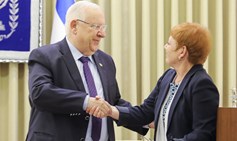
Democracy in Crisis? Israeli Survey Respondents Agree to Disagree
Written By: Prof. Tamar Hermann
Israel's 2018 Democracy Index, an annual survey of the health of Israeli democracy, shows off the deepest contradictions in Israeli life. Prof. Tamar Hermann explains why half the country thinks democracy is endangered but half do not, why the left-right divide is now seen as the most threatening division in Israeli society, but the number of Israeli Jews who think things are going well has been rising for over a decade

How to battle government corruption?
Written By: Prof. Yuval Feldman
In recent years we have seen one Prime Minister, several ministers and numerous mayors charged and convicted on corruption. But most people enter politics for idealistic reasons and with good intentions. So what went wrong?

The Case for Substantive Democracy
Written By: Yohanan Plesner
As calls for a "majoritarian democracy" gain strength in Israel, IDI's President warns of the dangers associated with a tyranny of the majority, and makes the case for a richer interpretation of democracy, grounded in the principles of liberty, equality and the separation of powers.

'Yes' to a Nation-State, 'No' to a Nationalistic State!
Leaders of the Israel Democracy Institute call for alternative proposal that would place nation-state of the Jewish people on equal footing with democratic obligation to equality for all Israeli citizens.

